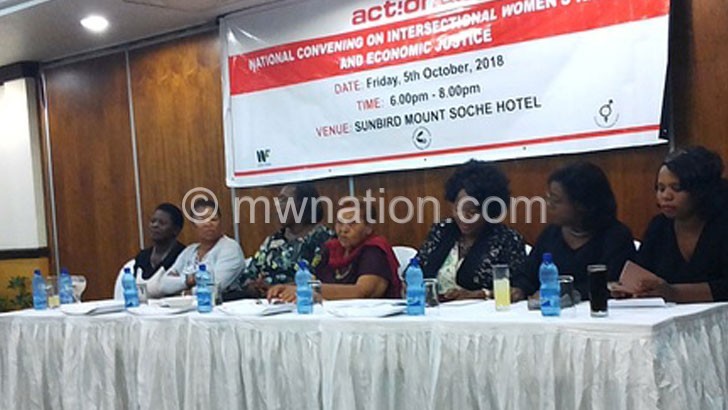Economists told to lead women’s economic rights
Female economists have been challenged to build national strategies for influencing gender-just changes in the economy.
The challenge came from the Ministry of Gender, Children, Disability and Social Welfare, Malawi Economic Justice Network (Mejn), Oxfam Malawi and ActionAid during a meeting on Gender Macro-Economic Policies and Gender Equality in Blantyre on Friday.
Speaking during the meeting, the ministry’s Principal Secretary Esmie Kainja said women play a vital role in the economy, but are left behind when it comes to issues of finance.

She said: “There is a huge gap between men and women who are involved in the decision-making in the country. We are encouraging these female economists to break these barriers in economy and to get involved in upholding the rights of women.”
Despite glaring figures showing that women are left behind, there is not much funding from the government to support women’s equal access to economic justice.
Figures show that the budget for the Ministry of Gender, Disability and Social Welfare has been declining over the years.
Out of the K15 billion that the ministry was allocated in the 2018/19 financial year, K11 billion of the money will come from donors.
Mejn executive director June Mtila Kambalametore said female economists should take a leading role in fighting against economic injustice that women are facing in the country.
“We need to fight for the rights of women in economic justice. Women are the building blocks of every economy and we should be proud as female economists that we are part of the people who can uphold our fellow women who are marginalised,” she said.
In her remarks, Oxfam deputy country director Lingalireni Lihowa said Malawi is prepared in terms of policy and legislative framework and yet more women are still marginalised on financial-related issues.
“Women are just given access to low levels of finance such as local agency banks. As female economists, we need to broaden the horizons, deal with financial inequalities and deal with cultures that block women’s access to financial management,” she said.
On her part, ActionAid Malawi head of programmes Peter Pangani said the meeting was a wake-up call for women economists in understanding their relevance to the prevailing challenges being faced by women in the attainment of gender equality and economic justice.
“As ActionAid, we have many programmes and we are glad that women’s economic justice is central to our programming,” he said.
Dominant economic models with its focus on profit-led growth perpetrates inequalities, impoverishment, rights violations and women are impacted disproportionately across the globe, according to various studies.
The inequalities which come in forms of income and consumption, leaves 1.2 billion impoverished people to account for only one percent of world consumption while the million richest consume 72 percent.





